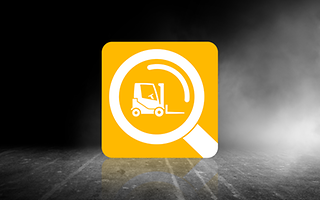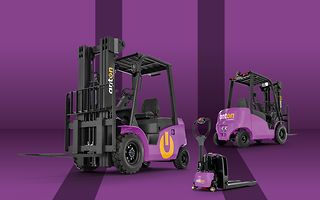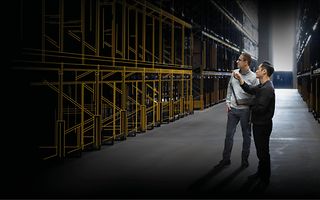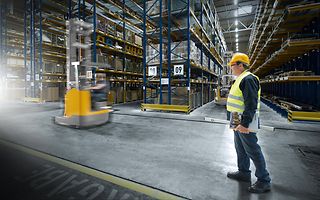- Incoming orders and revenue both at €3.8 billion
- EBIT €218 million
- Introduction of new corporate Strategy 2025+
- Coronavirus bonus: thanks to employees for outstanding work in the crisis
- Dividend proposal of €0.43 per preferred share
- 2021 forecast for revenue, incoming orders and EBIT above previous year
Despite the economic downturn caused by the coronavirus, Jungheinrich was able to close 2020 financial year better than had been initially expected at the beginning of the Covid-19 pandemic. All key figures are in the upper half of the forecast ranges, which had been increased in October 2020; some of them exceeded the targets. EBIT, EBT and profit or loss developed well under the unique circumstances. Jungheinrich increased its cash flow from operating activities considerably and built up significant net credit in the last financial year.
"Against the background of the more difficult general and market conditions caused by the Covid-19 pandemic, we are satisfied with last year’s business performance. Thanks to the measures taken early on to reduce costs and increase efficiency as well as our secured liquidity, we were able to successfully limit the negative impact of the pandemic on our business. The fact that we were able to achieve such a result during a year that has seen the greatest health and economic crisis since the Second World War all comes down to the outstanding commitment of our employees,” explains Jungheinrich Chairman of the Board of Management Dr Lars Brzoska.
In a market environment largely defined by the outbreak of the Covid-19 pandemic, revenue for the 2020 financial year came to €3.81 billion (previous year: €4.07 billion). The value of incoming orders, which includes the business fields new truck business, short-term rental, used equipment and after-sales services, amounted to €3.78 billion in 2020 due to a strong final quarter (previous year: €3.92 billion). Both values thus slightly exceeded the forecast range, which had been increased in October 2020. EBIT came to €218 million (previous year: €263 million), in the upper half of the forecast range, thus resulting in an EBIT ROS of 5.7 per cent (previous year: 6.4 per cent). Profit or loss amounted to €151 million (previous year: €177 million). Cash flow from operating activities exceeded the previous year’s figure significantly at €551 million (previous year: €345 million). In addition, net credit as of 31 December 2020 stood at €194 million; in comparison, the Group still reported net debt of €172 million as of the same date in the previous year. This corresponds to an improvement of €366 million. This positive development was driven by lower capital expenditure, the reduction of the short-term rental fleet and the release of working capital.
“Especially in times of economic difficulty, a strong balance sheet and solid liquidity is particularly important so that it’s possible to implement all necessary strategic measures and guarantee the financial independence of the Group,” explains Dr Volker Hues, Member of the Board of Management for Finance.
The Jungheinrich AG Board of Management proposes a dividend of €0.41 (previous year: €0.46) per ordinary share and €0.43 (previous year: €0.48) per preferred share. This dividend proposal will result in a total payout of €43 million (previous year: €48 million). The payment ratio of 28 per cent (previous year: 27 per cent) is in the company’s target range of paying between 25 per cent and 30 per cent of profit or loss to shareholders. “We are pleased that, even in this challenging year, we can uphold our policy of continuous dividend payments. A reliable participation of the shareholders in the company’s success is important to us,” says Dr Hues.
Successful coronavirus management
At the very beginning of the coronavirus crisis, Jungheinrich immediately created a central crisis team and established additional local crisis teams in its organisational units and factories in order to identify upcoming risks at an early stage and keep the impact of these risks as minimal as possible through timely, appropriate and coordinated measures. The top priority was to protect the employees, customers and business partners. To do so, Jungheinrich alone procured over 215,000 masks and over 20,000 litres of disinfectant in 2020. At the same time, extensive precautionary measures were taken to minimise the impact of the pandemic on supply chains and production. Around the world, the local units are in close communication with the respective authorities and are continuing to implement appropriate measures to ensure Jungheinrich’s ability to deliver. This made it possible for Jungheinrich to be there for its customers reliably throughout the crisis. Short-time working was only implemented at a few locations and to a limited degree in 2020.
“Thanks to the great dedication of our employees, our customers, especially those in critical sectors such as logistics, wholesale, food and pharmaceuticals, were always able to rely on Jungheinrich. Our colleagues have become our ‘yellow heroes’. Jungheinrich is proud of this team and is sure that it will go on to master all the upcoming challenges and achieve even more in the future,” says Dr Brzoska.
To thank all employees for this extraordinary commitment and to recognise the additional burden caused by the crisis, Jungheinrich paid its employees a special bonus totalling €13.5 million at the end of the year.
New corporate Strategy 2025+
In November 2020, Jungheinrich presented its new corporate Strategy 2025+ to the public. Over the coming years, Jungheinrich will focus on increasing profitability, efficiency and sustainability. After the Group had already achieved its strategic growth target for 2020 one year earlier than planned, Jungheinrich has made it its goal to create sustainable value for all its stakeholders: customers, employees, shareholders, business partners and society at large. The Group is focusing in particular on expanding its presence in the markets of Europe, China and North America. All activities are based on its holistic understanding of sustainability that takes equal account of economic, environmental and social aspects.
“Our intention is to be our customers’ first choice over the long term, offering them added value through forward-looking solutions and technologies. At the same time, we as a Group want to help shape economic, ecological and social developments. To achieve this, we are making Jungheinrich more profitable, more efficient and more sustainable,” explains Dr Lars Brzoska.
Forecast and outlook for 2021
Given the positive market development in recent months and the IMF’s growth expectations of 5.5 per cent for the global economy in the current year, Jungheinrich expects the global market for material handling equipment to continue to grow in 2021 in the mid-to-high single-digit percentage range. For its core market of Europe, it expects an increase in market volume in the mid single-digit percentage range.
Taking into account this economic and industry outlook, Jungheinrich expects a target range of €3.9 billion to €4.1 billion for Group revenue in 2021. Incoming orders are also expected to range between €3.9 billion and €4.1 billion. EBIT should amount to a value between €260 million and €310 million in the current financial year. EBIT ROS is expected to range from 6.7 per cent to 7.6 per cent. With regard to the development of material costs, Jungheinrich expects prices to rise noticeably in line with the broad economic recovery. According to current estimates, EBT should reach €240 million to €290 million; EBT ROS is anticipated to reach between 6.2 per cent to 7.1 per cent. This is based on the assumption that the financial market environment remains relatively stable. To ensure financial independence and to uphold an appropriate amount of financial leeway, Jungheinrich will continue to maintain a high level of liquidity. The Group is aiming for net credit to amount to significantly above €200 million at the end of 2021. ROCE for the 2021 financial year is expected to be between 14 and 18 per cent, due to the EBIT forecast that is significantly higher than the previous year’s.
All forecast values refer to organic growth. Despite the start of vaccination campaigns, uncertainties remain regarding the further spread of the coronavirus and the associated impact on customer demand and supply chains. The forecast is based on the assumption that the Covid-19 pandemic will not lead to lockdown measures over the course of the year that are more extensive than in 2020 or even to plant closures, and that the supply chains will remain intact. Measures to ensure our ability to deliver will be continued.
“The crisis year 2020 was an extraordinary test for us all – both professionally and privately. Because of our strong position we were able to successfully pass this test. We have proven how resilient and crisis-resistant Jungheinrich is. Even if the current year has more uncertainties related to the coronavirus in store, we are taking an optimistic approach due to the expected positive market development. We are concentrating on our profitable growth, increasing our efficiency and successfully implementing our strategy,” says Dr Brzoska.
| 2020 | 2019 | Change
% |
Incoming orders (units) | 111,400 | 121,900 | -8.6 |
Incoming orders (€ million ) | 3,777 | 3,922 | -3.7 |
Revenue (€ million) | 3,809 | 4,073 | -6.5 |
EBIT (€ million) | 218 | 263 | -17.1 |
EBIT ROS (%) | 5.7 | 6.4 | - |
EBT (€ million) | 200 | 242 | -17.4 |
EBT ROS (%) | 5.3 | 5.9 | - |
Profit or loss (€ million) | 151 | 177 | -14.7 |
Capital expenditure1) (€ million) | 75 | 157 | -52.2 |
R&D expenditure (€ million) | 89 | 86 | 3.5 |
Number of employees (FTE2), 31/12) | 18,103 | 18,381 | -1.5 |
- Property, plant and equipment and intangible assets without capitalised development expenditures and right-of-use assets.
- FTE = full-time equivalents; part-time employees were taken into account according to their hours.






